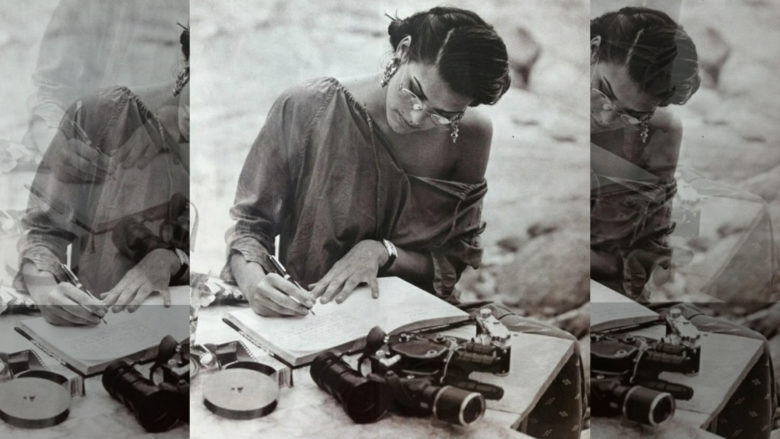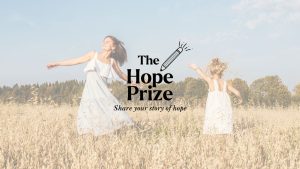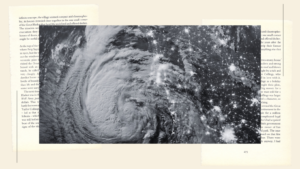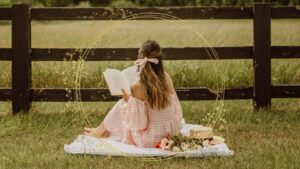It is 1995. Someone asks me what I want to be when I grow up.
‘A writer,’ I say without hesitation. I am six years old and I have yet to learn how to read and write.
‘What do you want to write about?’ the same person asks me.
‘A book,’ I reply.
‘A book about what?’
I have no idea; life has yet to happen to me.
It is 1997. We have moved from Bloemfontein to Worcester, a quaint little town in the Western Cape. My father regularly takes me to the one and only local library, hoping to awaken in me the love of words. He is a poet; he can easily string words together. He loves writing letters and he gives the gift of books to anyone he can. When gifting books, he always writes a prophecy or a short limerick on the first page.
I would also later find out that my maternal great-grandmother was a published writer; she even wrote for Huisgenoot. My maternal grandmother, with whom I would share a special bond, also writes poetry and is a great lover of books.
Writing and reading are in my blood, it can be said.
I have yet to discover a love for reading and eventually, writing. And so my father drags me to the library every other weekend or so, but I’m not interested.
It is 1999. My father drags me once again to the library, exasperated that I am not hooked. I can see he is on the brink of giving up hope. My father tells me to ‘go look at the teenage section’ while he browses the Wilbur Smith and Alistair MacLean aisle sections.
I wander into the teenage aisles, and the cover of one book catches my eye: Sweet Valley Twins – Don’t Go In the Basement.
The cover looks intriguing, the story scary. I take the book home and finish reading it within one week. I fall in love with stories.
I have been caught; hook, line and sinker.
It is 2000. I am twelve years old. By now I am a classic bookworm and the librarians know me by name. I visit the library almost every Saturday morning.
I say to my father, ‘One day, I’m going to build a house right next to the library, and I’m going to live there.’
My first job is, of course, at this same library. My father secretly arranges this ‘job’ for me. At first, the librarians tell my father that I can’t work there because only ‘qualified’ people are allowed to. Also, they are on a budget and won’t be able to pay me a salary. My father, never without a plan, comes back to them with a proposition:
‘Let Vicki do the odd jobs here and there, and I will pay her a salary.’
And so two Saturdays a month I work at the library from 9 a.m. till 12 p.m. I arrange and stack the shelves, sort out returned books, put new stickers on the back of the book covers. I got paid R40 per month for my work.
It is 2003. I get my first cell phone and I am overjoyed; no longer do I have to ask other people to do my phone calls for me. I can send text messages! And receive them! This sudden independence in the communication world is truly wonderful.
My parents quickly pick up that I am good with words through the text messages that I send.
My father tells my mother, ‘Look at these text messages Vicki sends us. She has a way with words.’
At my Bat Barakah (Daughter’s Blessing – a rite of passage), my father blesses me in my identity as a young woman. He prophesies that I am going to be a ‘researcher and a writer.’
I am twelve years old, and I don’t like the image of that. To the teenager in me, it sounds dull, tedious and predictable. I do not want to be a writer, and I definitely don’t want to be a researcher. Ugh.
It is 2005. I still read books, but now I also read magazines. There’s a teenage magazine called BRIO, that I get monthly from the U.S. I devour every page and wait impatiently each month for the next issue to arrive. BRIO hosts an annual writing competition where teenage girls from all over the world can enter and then win various prizes. The final winner gets to write for BRIO for one year.
I take one look at the prizes and I am highly motivated: CDs, books, clothes, shoes, and more. I especially like the CDs and books part.
I enter this competition; over 950 girls participate that year. Each one of us has to write two short motivational articles, as well as answer a couple of personal questions.
I get chosen as one of the TOP 20 finalists, and win, win, win so many gift prizes!
The TOP 20 finalists then have to write more motivational articles, as well as make a short video introducing themselves.
I get into the TOP 8! And win more gift prizes! (Sadly, I don’t get into the TOP 4, nor am I the eventual winner).
But this is a great learning experience for me, and it awakens a desire within me to finally start writing. I have tipped my toe in the water, and it is a nice, cool and calming feeling.
I start to write a book. Every day, as soon as I come home from school, I sit in front of the computer in the living room, and I write.
I share my words with a friend, Chantelle. She loves my story and encourages me to keep on writing. Every day, at school, Chantelle asks me: ‘Have you written any more words? Can I read the pages?’
I get to about 20,000 words and then I stop.
It is 2007. We no longer live in Worcester; we have moved back to Bloemfontein. One afternoon, I sit down and write about the traumas I have experienced after being shot in a shooting accident. I am fifteen years old. The words come pouring out of me, it flows and I cannot stop it. It is a healing and cathartic experience.
I email this testimony to a national Christian magazine called Truth. Within an hour, I get a response from the editor. She’d love to publish it in the next issue. I print out that email and I keep it.
Up to this day, I still have that letter.
I start journaling, just for myself. My journals are precious and even though I do not go back to read it again, it is a safe place where I can make spelling mistakes, write in anger, sometimes in sadness. These journals are meant for me, and only for me.
I receive a celebratory certificate from the Bloemfonteinse Skrywersvereniging – my first writing achievement acknowledgment.
I attend a writing course at Creare, one of the best writing courses I have ever attended up to this day. In this course, I learn all about the senses and how we can use it to describe our worlds through writing. Truly an amazing experience. I write my exam and get 82%.
I also write for the ATKV Woordwoekeraars Skryfkompetisie. My essay is titled ‘Generasie Pyne? Nie Myne!’ and I get 79% and the feedback buoys me.
It is 2008. By now I am truly highly motivated and encouraged in focusing on my writing career. I am 18 years old, and I have just finished school. I apply to study at the University of the Free State. I receive a scholarship because of my hearing impairment.
I show them my writing accomplishments thus far and ask the university for advice on what I should study.
‘You could probably study journalism; although you should rather study creative writing. Unfortunately, we do not have creative writing available.’
I am a bit discouraged. I decide in the end not to study at the university. Instead, I start waitressing at the Olive Ranch Estate, as well as Emoya Estate. In between I do a 2-years-writer’s course over the internet from the U.S. I have my own mentor and she helps and guides me.
I start writing for LIGnet, an Afrikaans website for teenagers. And I am getting paid. It’s only R200 per article, but it’s something and I finally feel like a professional.
I attend the Riana Scheepers Short Story Workshop, hosted by Volksblad.
Once again, I receive a Bloemfonteinse Skrywersvereniging certificate for my writing accomplishments. The same establishment also gives me the Douwlina du Plessis Beginner’s Trofee, and I appear in the local newspaper for that.
In between, I keep on journaling.
It is 2009. I join 13thFLOOR, a non-profit performing arts group. I am still writing for LIGnet, as well as Vision magazine. Through me, LIGnet becomes an official sponsor of 13thFLOOR; they give us T-Shirts, a backpack, and the editor of LIGnet gives us a short speech.
The first 4 months of the year we get training in Pretoria, and then we travel all over South Africa for the next 7 months. I am the only one in a team of 60 young adults with a laptop, and I take it with me everywhere we go.
This is the year that I get my first taste at being published in a book. Finesse magazine wants to publish a diary for teenage girls called Finesse Meisie Dagboek; they are asking for young writers to write short devotional pieces to be put in this diary.
Of course, I immediately write a couple of devotional pieces. They all get accepted for publication, and I am so excited when the diary is available in bookstores everywhere.
I receive another Bloemfonteinse Skrywersvereniging celebratory certificate for my writing achievements.
I don’t journal as much this year, but I try to write a page every now and then.
It is 2010. I am nineteen years old, and now I am Miss Deaf South Africa. This title gives me the platform to build further upon as a writer. I get to use my title to ask for writing columns in magazines and newspapers.
That’s My Girl. SA Horseman. Devoted. Manna. MyMag. Ditsem Vrystaat. Ladybrand Newsletter. Average Girl.
The only downside to this? I only get paid R200 per article for Ditsem Vrystaat. The rest of them, I have to do for free.
This year is incredibly busy. Motivational talks, television interviews, school visits, newspaper and magazine photoshoots, etc.
I have to market myself, send out emails, arrange meetings, knock on doors. I do not have a team working with me or for me; everything has to be done by yours truly.
I am struggling to keep up with the writing deadlines. I have almost completely stopped journaling.
It is 2011. A publisher asks me to write a memoir about my life after seeing me on television. I know I can do something like this, but I am so busy.
By the end of 2011, the publisher tells me that I need to start writing this book.
So I clear out my schedule for November and December and start writing. Within six weeks, I have written 40,000 words, and Viva la Vicki! is born.
It is 2012. My first book and memoir is published. I am a bit discouraged; my publisher is not marketing my book as I would’ve liked and the book is not available in all the stores. Fans and supporters are contacting me, asking where they can find the book, as they can’t seem to find it at the local bookstore.
It seems like once again, I am the one that has to do it all. I market my book, I keep copies of the book in my car, I sell my books at every event and function where I am the guest speaker. I even let people on Facebook order my book directly through me, and then I post it to them.
It makes me wonder: What’s the point of having a publisher when you have to do it all by yourself?
If I could do it over again, I would instead self-publish this book.
I take a bit of a break and attend Riana Scheepers’ Skool vir Skryfkuns & Kreatiewe Denke in Wellington. It takes place over the course of five days, and I am truly inspired. Riana spoils us, bakes and makes us wonderful treats and it takes place on her truly divine wine farm. Outside there’s a vineyard and her house is old Victorian.
I attend two more writing schools that same year, hosted in Bloemfontein: the Francois Bloemhoff Slypskool and the Colin Wilson Writing School.
This is also the year that I decide I’m going to stop writing for free. I contact all the magazines and newspapers that I’ve been writing for, and I tell them I’m moving to the Western Cape and I plan on focusing my attention on studying at the University of Stellenbosch.
It is 2013. We have moved back to Worcester, once again. With all my heart, I want to study creative writing. The University of Stellenbosch offers Creative Writing, but only as a Master’s Degree. I first have to finish a BA degree, then I can apply for creative writing.
I have a meeting with the head of Creative Writing, and I ask him, ‘Can’t I just do the MA degree? Look at this: I have already written a book, and my writing CV is impressive.’
‘No,’ he says to me without even looking at my CV and my published book. ‘You have do finish a BA degree first.’
I apply for a BA degree, I also receive a scholarship due to my hearing loss.
I attend classes for about two weeks. The classes have about 500+ students each, and I am overwhelmed and lost. My mom and I decide: I should not study at Stellenbosch.
When I go to give back my scholarship, I am in tears and my heart is broken.
Hardly any of my writings get published this year, but now I journal like crazy.
It is 2014. I am 25 years old. By now I have a cochlear implant in my right ear. I am relieved that I didn’t study at Stellenbosch, as the road to recovery and rehabilitation with my cochlear implant has been long and tiresome.
I manage to write my second book, God Lief My, which is a devotional book for teenage girls. I am with a different publisher now, and it looks like they are much better with their marketing, as I am getting good payments for this book.
I also write two Vrouekeur short stories, and both are accepted for publication and I even get paid handsomely for them.
I write for DevoZine, a Nashville-based magazine and also get paid for my written works; the international banking fees are expensive, though.
It is 2015. This year is an extremely hard year for me and my family. I get a cochlear implant in my left ear as well, but this time around the recovery is quick and rehabilitation super easy.
I write a few devotionals for Pienk Tekkies, published by Carpe Diem Media. I attend the WGSA Documentary Writing Knowledge Session in Woodstock, Cape Town. I also attend the ATKV Kinderboekskryfskool with my mom in Johannesburg.
My family and I get a heaven-send breakthrough and move to Johannesburg in May.
It is 2016. I visit a well-known publishing company. They are highly interested in publishing a series of teenage books that I want to write. I visit their office, speak to the boss, and we come up with a plan for my books.
But I leave their office in tears.
My mom and dad are in the car, and they ask me what’s wrong.
‘They want me to market my book myself. I wish I could just focus on writing,’ I explain.
I withdraw my offer to write for this publishing company and instead decide to stop writing altogether. I will still journal, but I am tired and I do not want to market my work, sell my books at events, do motivational talks.
I pull the plug altogether.
But before I do, I write a couple more devotional pieces for a book called 5 Minute Met Jesus.
It is 2017. I have chosen the normal, mundane lifestyle: I have a 9-5 job, get paid a salary at the end of the month, and I am engaged to be married. Normal, predictable, safe.
Until it is not safe for me in my relationship anymore. I first postpone the wedding, then break up with the guy. I resign at my job and go overseas instead. I go to Redding, California, and attend Bethel School of Supernatural Ministry (BSSM). Every day is like open-heart surgery; I go through boxes of tissues every week. I cry until I am tired of crying.
But I start dreaming again of writing. The words are still inside of me; they want to come out.
It is 2018. My father has passed on. My mom and I move back to Bloemfontein. Bloemfontein, where I was born. Bloemfontein, where my grandmother is. Bloemfontein, a safe place to just breathe and be.
I do not write this year.
It is 2019. Authenticity. That is what I want for my writing. I want it to be real, honest, open and raw. I start a blog. Slowly but surely, I start again. It is scary. I do not know if I can still write. But surprisingly, I still can. Doubt is our greatest enemy. I write in spite of it.
My writing is different. Not everyone likes it. My family is worried about me. It is not as it used to be. But they need not be worried, for I am becoming me. The true, authentic version of who I am truly meant to be.
I am shedding off religion, misconceptions, people’s ideas of who I am supposed to be.
I am thirty years old.
I am journaling again, as well.
It will be 2020. Soon. My hopes for the next year is to study. And this time I’m going to stick to it. I have applied to Simpson University in Redding, California, as well as the University of Stellenbosch (again).
Both have offered me scholarships; I am still waiting for the final stamp of approval from either/both. Hopefully, I can get to decide where I want to go in this next chapter of my life.
As for my writing? I will keep on, writing on.




